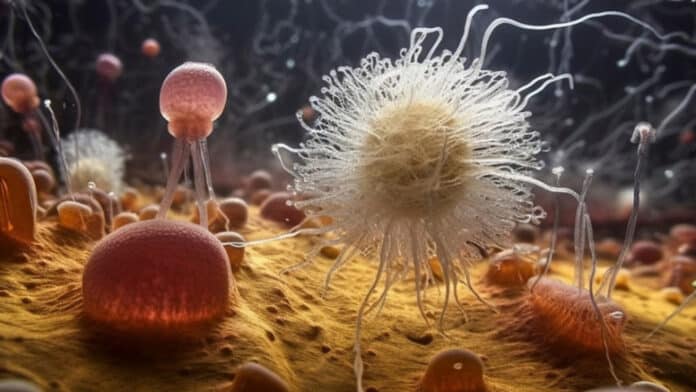Surprisingly late in our planet’s history, eukaryotic life has flourished. The lack of steranes supports this theory, the molecular remains of the eukaryotic membrane sterols, and the low diversity of definitive eukaryotic fossils in marine deposits from the mid-Proterozoic period. It is challenging to square this dearth of eukaryotic remnants with molecular clocks, which indicate that the LECA evolved between roughly 1,200 and more than 1,800 million years ago.
Scientists from The Australian National University (ANU) have discovered a lost world of ancient organisms that lived in Earth’s waterways at least 1.6 billion years ago. This discovery is expected to change our views of our earliest ancestors.
These microscopic critters also referred to as the “Protosterol Biota,” are eukaryotes, a group of organisms. They are believed to be our earliest known ancestors.
These extinct animals were prevalent in marine habitats worldwide and likely influenced ecosystems for a significant portion of Earth’s history. According to the researchers, the Protosterol Biota predated the emergence of any animals or plants by at least a billion years.
These early eukaryotes’ fossilized remnants have been sought after for a long time, yet they are incredibly rare. Ancient waters on Earth rather resembled a bacterial stew. It remains elusive: why didn’t our highly capable eukaryotic ancestors come to dominate the world’s ancient waterways? Where were they hiding?
This new study flips this theory on its head. Scientists have shown that the proto-sterol biota was abundant throughout the world’s prehistoric oceans and lakes, lurking in plain sight. Only today, scientists knew where to look for them.
Professor Jochen Brocks from ANU, who discovered with Dr. Nettersheim, said the Protosterol Biota were undoubtedly more complex than bacteria and presumably larger, although it’s unknown what they looked like.
“We believe they may have been the first predators on Earth, hunting and devouring bacteria.”
According to scientists, these creatures thrived from about 1.6 billion years ago until about 800 million years ago. Like dinosaurs went extinct, perhaps the Protosterol Biota had to disappear a billion years earlier to make space for modern eukaryotes.
Scientists discovered this by studying fossil fat molecules found inside a 1.6-billion-year-old rock that had formed at the bottom of the ocean near what is now Australia’s Northern Territory. Early complex animals that arose before LECA and have since gone extinct may have existed because of the molecules’ primitive chemical structure.
Dr. Benjamin Nettersheim, who completed his Ph.D. at ANU and is now based at the University of Bremen in Germany, said, “Without these molecules, we would never have known that the Protosterol Biota existed. Early oceans largely appeared to be a bacterial world, but our new discovery shows that this probably wasn’t the case.”
Professor Brocks said: “Scientists had overlooked these molecules for four decades because they do not conform to typical molecular search images.”
“But once we knew what we were looking for, we discovered that dozens of other rocks, taken from billion-year-old waterways worldwide, were also oozing with similar fossil molecules.”
Journal Reference:
- Brocks, J.J., Nettersheim, B.J., Adam, P. et al. The lost world of complex life and the late rise of the eukaryotic crown. Nature (2023). DOI: 10.1038/s41586-023-06170-w
